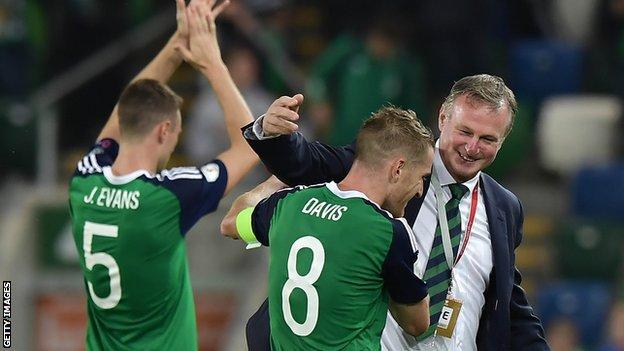Michael O'Neill: Northern Ireland boss in no rush to take club job
Last updated on .From the section Football
Northern Ireland manager Michael O'Neill says he is wary of leaving the international scene for a club job.
O'Neill's stock is high after guiding his country to Euro 2016 and the brink of the 2018 World Cup play-offs.
"The direction a club goes in now, I'm not sure the manager has influence," the 48-year-old former midfielder told BBC Radio 5 live's Adrian Chiles.
"I look at the Premier League and you are not really managing a club, you are just there to try to get results."
O'Neill, who won 33 caps, says he is attracted by the excitement of the club game but that international managers are given "more time to build".
The former Cowdenbeath assistant and Brechin manager lost his first two games as Northern Ireland boss - 3-0 to Norway and 6-0 to the Netherlands.
He drew five of his next seven games, including in Portugal, and it took until his 10th game in charge for his side to win, a 1-0 victory over Fabio Capello's Russia.
Yet O'Neill was given a new two-year contract by the Irish Football Association in 2013, and within two years had guided his country to a major finals.
They have since guaranteed second place in their World Cup qualifying group and only an unlikely series of results will deny them a place in next month's play-offs.
Germany travel to Windsor Park on Thursday before the final group match in Norway three days later.
"It can be very difficult at international level if you have limited resources but you are given the opportunity and I think that is what the IFA did with me," O'Neill said.
Since Sir Alex Ferguson's departure from Manchester United after 27 seasons in charge, Arsene Wenger has been the Premier League's longest-serving manager and the Frenchman celebrated his 21st anniversary as Arsenal boss at the weekend.
In contrast, Frank de Boer lasted just four league matches as Crystal Palace manager.
O'Neill said: "Sir Alex Ferguson has gone and Arsene Wenger is still there, but the rest are pretty much there to keep teams in the Premier League or aspire to do something at the top end of the league.
"That's purely their focus, they don't have time or focus to look at the direction of the club.
"When I think would I want to be in that environment, of course you see the big games and you love that environment and atmosphere - but equally you look at the situation at Crystal Palace and essentially the manager was sacked after three games.
"It's a very difficult scenario because things can go against you in two or three games that are not necessarily down to how you've prepared the team. Things can go against you and ultimately it can cost you your job.
"That's where management has changed dramatically with regards to the Premier League."

O'Neill, who succeeded Nigel Worthington in 2011 after resigning as Shamrock Rovers manager, has steered his country to an all-time high of 20th in the Fifa rankings. They were 129th in 2012.
The former Newcastle United, Dundee United and Hibernian midfielder believes getting his experienced players onside was a crucial component in that rise.
"Expectation was low when I took over. The previous campaign had finished disappointingly and the team wasn't in a great place," said O'Neill.
"If you'd said to me then that you will go to a major championship and have an opportunity to go to a World Cup, it wouldn't have been a realistic goal in my head.
"There were some senior players contemplating their international careers. Aaron Hughes had retired and I managed to talk him out of it and Chris Baird was thinking about it and again I talked him out of it and he came back and played for a further three years.
"The only real way to get results was to make the experience when the players are away that bit more enjoyable.
"For us to do well we needed our big players - Hughes, Steven Davis, Gareth McAuley, Chris Brunt, Jonny Evans - to play eight, nine, 10 games in any campaign.
"To have success we needed everyone's buy-in and to believe we weren't as far away as everyone believed."






